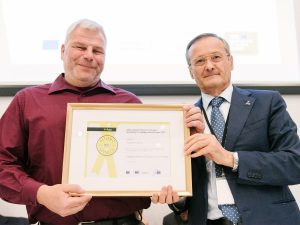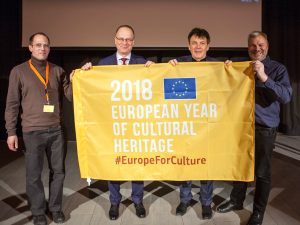Engaging citizens with Europe’s cultural heritage
This initiative began at the IE conference 2016 ‘Heritage interpretation – for the future of Europe’ and ended at the IE conference 2018 ‘Heritage and identity’. It was IE’s contribution to the European Year of Cultural Heritage and sparked reflection on the socio-political role of heritage interpretation.
Duration: 2016 – 2018
Country/countries: Western Balkan Region
Aims: Exploring the possibilities of heritage interpretation to make heritage more meaningful to people but also to make people more mindful of our common future.
Outcomes: Study paper Engaging citizens with Europe’s cultural heritage, Admission to the European Heritage Alliance, the Stakeholder Committee for the European Year of Cultural Heritage and subsequently the EU Expert Group on Cultural Heritage (Cultural Heritage Forum)

About the initiative
‘Engaging citizens’ was triggered by the rise of populist and Eurosceptic movements. In 2016, Donald Trump was elected US President and the majority of the population of the UK voted to leave the EU. Both had a lot to do with the way heritage was interpreted, and this raised the question of the extent to which professional heritage interpreters should stay out of this process.
One key idea was to complement the formal education sector, which was increasingly focused on the acquisition of knowledge and skills, by encouraging more reflection on human values in non-formal learning. IE members compiled examples of where this is already happening.
Another consideration was whether and how heritage interpretation could contribute to bridging social divides through working with universal human values. This included greater engagement of visitors but also local people and greater encouragement to interpret for themselves.

What we have achieved
IE used the opportunity to conduct workshops for the European Commission (Task Force for the European Year of Cultural Heritage) and for the Council of Europe (National Coordinators of the European Heritage Days), where the approaches were highly recognised.
This culminated in the award of the Altiero Spinelli Prize 2017 by the EU Commission and Parliament and in the personal attendance and opening of the IE conference 2018 by the Tibor Navracsics, EU Commissioner for Education, Culture, Youth and Sport. In a welcome address to the IE Conference 2016, the Commissioner had already written: “Through interpretation, I believe heritage can contribute to the building of communities, not just at local level, but also on national and European levels. Bringing citizens closer to their heritage is about bringing them closer to each other, and this is an important step towards a more inclusive society.”

As a result of the initiative, IE was invited to several panels at international events. Three times in a row it was accepted as contributor to the EU Structured Dialogue ‘Voices of Culture’ in Brussels and two times in a row it spoke at the European Heritage Days General Assembly in Strasbourg.
IE was admitted to the European Heritage Alliance and appointed to the Stakeholder Committee for the European Year of Cultural Heritage. This subsequently led to its appointment to the permanent EU Expert Group on Cultural Heritage (Cultural Heritage Forum).
